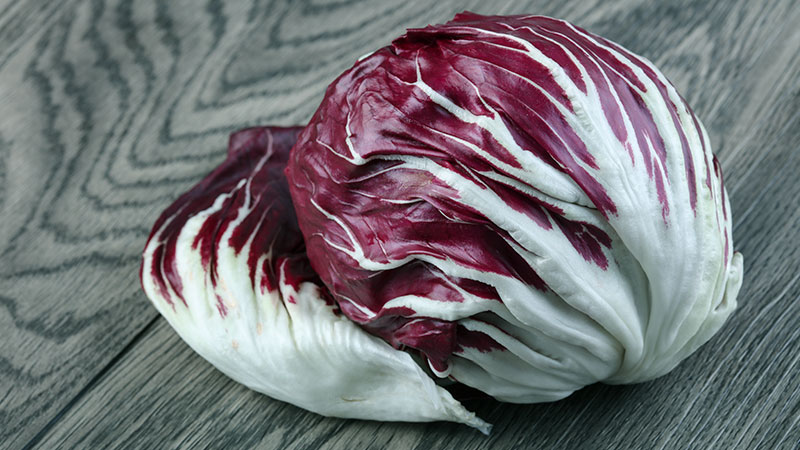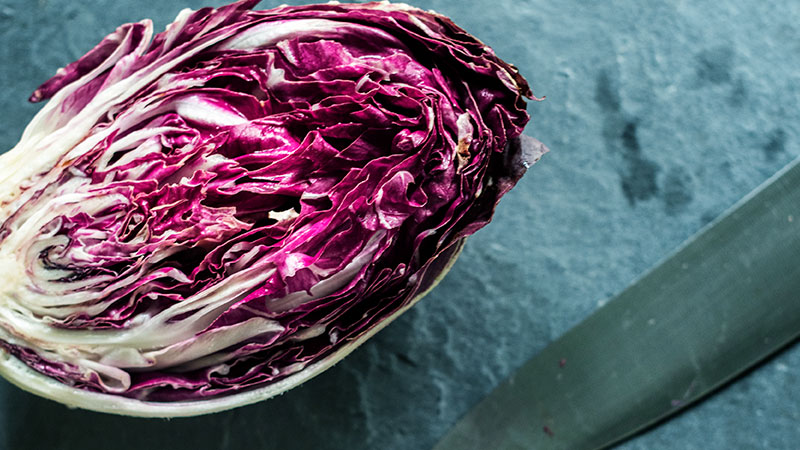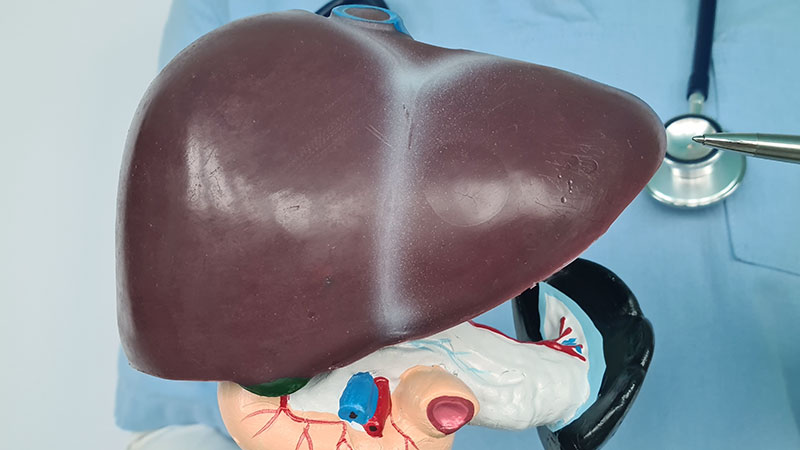Curious about the health benefits of radicchio? This vibrant, red-leafed vegetable is more than just a colorful addition to your salad, it’s a nutritional powerhouse.
Packed with antioxidants, vitamins, and minerals, radicchio offers numerous health benefits that can significantly enhance your well-being.
From supporting digestive health to promoting heart health, and boosting your immune system, radicchio is a versatile ingredient that deserves a spot in your diet.
Discover twelve compelling health benefits of radicchio and learn how this slightly bitter, yet delicious vegetable can contribute to your overall health.

What is Radicchio?
Radicchio is a vibrant leafy vegetable that belongs to the chicory family, known scientifically as Cichorium intybus. It is easily recognizable by its striking red or purple leaves, which often have white veins running through them.
Radicchio is renowned for its slightly bitter and spicy flavor, which adds a unique taste to various dishes.
Origins and Varieties
Radicchio originated in Italy, where it has been a staple in Italian cuisine for centuries. It comes in several varieties, each with its own distinct characteristics:
- Chioggia Radicchio: The most common type, shaped like a small cabbage with deep red leaves and white veins.
- Treviso Radicchio: Resembling a red endive with elongated leaves, Treviso has a milder flavor compared to Chioggia.
- Tardivo Radicchio: A variety of Treviso, it has a distinctive shape with curled, pointed leaves and a pronounced bitter taste.
- Castelfranco Radicchio: Known as the “orchid lettuce,” it features pale green leaves with red speckles and a milder flavor.
Culinary Uses
Radicchio is a versatile ingredient in the kitchen. It can be enjoyed raw in salads, where its bitterness pairs well with sweet and tangy dressings.
Cooking radicchio can mellow its bitterness and bring out a subtle sweetness, making it suitable for grilling, roasting, or sautéing. It is often used in Italian dishes like risotto, and pasta, and as a topping for pizzas.
Nutritional Profile
Radicchio is not just flavorful but also packed with nutrients. It is low in calories and high in fiber, making it an excellent choice for those looking to manage their weight.
Radicchio is rich in vitamins such as vitamin K, vitamin C, and vitamin A, and provides essential minerals like calcium, magnesium, and potassium. Its deep red color indicates a high level of antioxidants, particularly anthocyanins, which offer numerous health benefits.
Health Benefits
The health benefits of radicchio are extensive, including:
- Antioxidant Properties: Helps combat oxidative stress and reduce the risk of chronic diseases.
- Digestive Health: High fiber content promotes regular bowel movements and supports a healthy gut microbiome.
- Heart Health: Fiber and antioxidants contribute to lowering cholesterol and reducing inflammation.
- Bone Health: Provides essential nutrients like calcium, vitamin K, and magnesium.
- Immune Support: Rich in vitamin C, which is vital for immune function.
Radicchio is a nutritious and flavorful addition to any diet. Whether you’re enjoying it raw in a fresh salad or cooked in a savory dish, its unique taste and health benefits make it a valuable ingredient.
By incorporating radicchio into your meals, you can enjoy its culinary versatility while boosting your nutritional intake and supporting overall health.
12 Health Benefits of Radicchio
Radicchio, often mistaken for a type of lettuce, is actually a variety of chicory known for its vibrant red or purple leaves and slightly bitter taste.
Originating from Italy, radicchio is a staple in Mediterranean cuisine and has garnered attention for its numerous health benefits.
This leafy vegetable is not only a colorful addition to your plate but also a powerhouse of nutrients that can significantly contribute to your overall health. In this article, we will explore twelve health benefits of radicchio in detail.
1. Rich in Antioxidants

Radicchio is abundant in antioxidants, particularly anthocyanins, which give the vegetable its distinctive red color. Antioxidants are compounds that help combat oxidative stress by neutralizing free radicals in the body.
Oxidative stress is linked to various chronic diseases, including heart disease, cancer, and neurodegenerative disorders.
By incorporating radicchio into your diet, you can boost your antioxidant intake, thereby protecting your cells from damage and reducing the risk of chronic diseases.
2. Supports Digestive Health

Radicchio is an excellent source of dietary fiber, which is essential for maintaining a healthy digestive system. Fiber adds bulk to the stool, promoting regular bowel movements and preventing constipation.
Moreover, fiber acts as a prebiotic, feeding the beneficial bacteria in your gut. A healthy gut microbiome is crucial for efficient digestion, nutrient absorption, and overall gastrointestinal health.
Including radicchio in your meals can thus support your digestive system and promote balanced gut flora.
3. Promotes Heart Health

The phytonutrients and antioxidants in radicchio play a significant role in promoting heart health. Anthocyanins, in particular, have been shown to reduce inflammation and oxidative stress, both of which are risk factors for cardiovascular diseases.
Additionally, the fiber content in radicchio helps lower cholesterol levels by binding to bile acids in the gut, which are then excreted from the body.
This process forces the liver to use up more cholesterol to produce bile acids, thereby reducing the overall cholesterol levels in the blood and lowering the risk of heart disease.
4. Aids in Weight Management

For those looking to manage their weight, radicchio can be a valuable addition to their diet. It is low in calories but high in fiber, which helps you feel full and satisfied after meals, reducing the likelihood of overeating.
The high water content in radicchio also contributes to a feeling of fullness without adding extra calories. By incorporating radicchio into your diet, you can enjoy a nutrient-dense food that supports your weight management goals.
5. Enhances Bone Health

Radicchio contains several nutrients essential for bone health, including calcium, vitamin K, and magnesium. Calcium is well-known for its role in maintaining strong bones and teeth.
Vitamin K is crucial for bone metabolism and helps in the regulation of calcium, promoting bone density and reducing the risk of fractures. Magnesium supports the structural development of bones and is involved in the regulation of calcium and vitamin D.
Regular consumption of radicchio can thus contribute to the maintenance of healthy bones and prevent bone-related disorders such as osteoporosis.
6. Boosts Immune Function

The immune-boosting properties of radicchio can be attributed to its rich content of vitamins and antioxidants. Vitamin C, found in significant amounts in radicchio, is essential for the proper functioning of the immune system.
It stimulates the production of white blood cells, which are vital for fighting infections. Additionally, the antioxidants in radicchio help protect immune cells from damage caused by free radicals, ensuring a robust and efficient immune response.
Including radicchio in your diet can thus enhance your body’s ability to ward off illnesses and infections.
7. Supports Eye Health

Radicchio is a good source of vitamin A, in the form of beta-carotene, which is essential for maintaining healthy vision. Vitamin A plays a crucial role in the production of rhodopsin, a pigment in the retina that helps you see in low-light conditions.
Additionally, the antioxidants lutein and zeaxanthin, found in radicchio, help protect the eyes from oxidative damage and reduce the risk of age-related macular degeneration and cataracts.
By incorporating radicchio into your diet, you can support your eye health and preserve your vision.
8. Regulates Blood Sugar Levels

The fiber content in radicchio not only supports digestive health but also helps regulate blood sugar levels.
Fiber slows down the digestion and absorption of carbohydrates, preventing spikes in blood sugar levels after meals. This is particularly beneficial for individuals with diabetes or those at risk of developing the condition.
Additionally, the antioxidants in radicchio help reduce inflammation and oxidative stress, which are linked to insulin resistance. By including radicchio in your diet, you can support better blood sugar control and overall metabolic health.
9. Enhances Skin Health

The vitamins and antioxidants in radicchio contribute to healthy, glowing skin. Vitamin C plays a key role in collagen synthesis, which is essential for maintaining the skin’s elasticity and firmness.
It also helps protect the skin from damage caused by UV rays and environmental pollutants. The antioxidants in radicchio, such as anthocyanins, help neutralize free radicals that can cause premature aging and skin damage.
Including radicchio in your diet can thus promote healthy, youthful skin and reduce the signs of aging.
10. Detoxifies the Liver

Radicchio has natural detoxifying properties that can support liver health. The bitter compounds in radicchio, such as lactucopicrin, stimulate the production of bile, which is essential for the digestion and absorption of fats.
Bile also helps eliminate toxins from the liver, promoting detoxification.
Additionally, the antioxidants in radicchio help protect liver cells from oxidative damage, ensuring the liver functions efficiently. Regular consumption of radicchio can thus support liver health and enhance the body’s natural detoxification processes.
11. Anti-Inflammatory Properties

Chronic inflammation is a risk factor for many diseases, including heart disease, diabetes, and cancer. The antioxidants in radicchio, particularly anthocyanins and polyphenols, have potent anti-inflammatory properties.
These compounds help reduce inflammation by neutralizing free radicals and inhibiting the production of pro-inflammatory molecules. By including radicchio in your diet, you can help reduce inflammation in the body and lower the risk of chronic diseases.
12. Provides Essential Vitamins and Minerals

Radicchio is a nutrient-dense vegetable that provides a wide range of essential vitamins and minerals. It is an excellent source of vitamin K, which is important for blood clotting and bone health.
It also provides vitamin C, vitamin A, and several B vitamins, which are essential for various metabolic processes in the body. The minerals in radicchio, such as calcium, magnesium, potassium, and iron, support bone health, muscle function, and red blood cell production.
By incorporating radicchio into your diet, you can ensure a steady intake of these vital nutrients, supporting overall health and well-being.
Radicchio is more than just a colorful addition to your salad; it is a nutritional powerhouse with a myriad of health benefits.
From its rich antioxidant content to its digestive and cardiovascular support, radicchio offers numerous advantages that can enhance your overall health.
Wrapping Up
Incorporating radicchio into your diet offers a multitude of health benefits that can enhance your overall well-being.
From its rich antioxidant content that combats oxidative stress, to its high fiber that supports digestive health and weight management, radicchio is a nutritional powerhouse.
It also promotes heart health, strengthens bones, boosts immune function, and supports eye health. Additionally, its anti-inflammatory properties and ability to regulate blood sugar levels make it a valuable addition to any diet.
Whether enjoyed raw in salads or cooked in various dishes, radicchio’s unique flavor and vibrant color add both taste and nutrition to your meals. Embrace the health benefits of radicchio and make it a regular part of your culinary repertoire for a healthier lifestyle.
